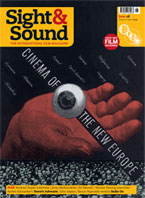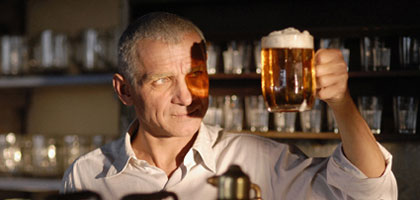
I Served the King of England
Czech Republic/Slovakia/Japan 2006

Reviewed by Geoffrey Macnab
Synopsis
Our synopses give away the plot in full, including surprise twists.
The early 1960s. Jan Díte is released from a Czech communist correctional facility after nearly 15 years in captivity. Flashbacks showing his earlier life are interspersed with scenes of him post-captivity - he has a dead-end job laying gravel on the roads.
As a young man, Díte makes money by selling sausages to travellers at the railway station, and through observing the people around him comes to believe that avarice is common to all classes. He becomes a waiter, discovers the joys of sex at a local brothel, and plots his climb to the top. His career takes him to a series of ever more prestigious hotel restaurants. His life is transformed in the Nazi era: after meeting Líza, a beautiful German teacher of physical education, he throws in his lot with the Nazis. After the German occupation of Czechoslovakia, his stock rises. He is allowed to marry Líza. She uses her contacts to get him a job at one of his old hotels, now a centre for breeding pure Germans. His job is to get young Aryan women ready for intercourse. When he fails to impregnate Líza, she enlists to go to the Front.
As the Germans begin to retreat, Líza returns from the Front, bringing a hoard of stamps stolen from deported Jews. Líza is killed when the hotel burns down at the end of the war. Díte sells the stamps and becomes a millionaire. When the communists come to power in Czechoslovakia, he is arrested and imprisoned. By the time he is released, he is a wiser man.
Review
I Served the King of England is the latest of several Jirí Menzel films adapted from the novels of his close friend Bohumil Hrabal, who died in 1997. (Menzel's adaptation of Closely Observed Trains won an Oscar and was one of the key films in the emergence of the Czech New Wave; his 1969 feature Larks on a String, which he co-wrote with Hrabal, was banned by the communist authorities.) Now 70, Menzel has had an uneven directorial career since the heady days of the 1960s. Unlike his contemporaries Ivan Passer and Milos Forman, he didn't move to the US following the Soviet invasion of 1968, and publicly dissociated himself from his pre-invasion films, including Closely Observed Trains.
His own background must have given him a special affinity with Díte, the diminutive hotel-waiter anti-hero of I Served the King…, who is also obliged to perform a few ideological somersaults. As depicted by Menzel, Díte has more than a hint of Charlie Chaplin or the Good Soldier Svejk about him; he is a hapless everyman being carried along on the tide of history. His goal is simply to be accepted, and he will go to extreme lengths to give pleasure, whether to his customers, his sexual partners or - most disastrously - to the Nazis who've occupied his homeland.
The young Díte, played in very appealing fashion by Bulgarian actor Ivan Barnev, is generally far too interested in money and status to notice what's going on around him. Nothing seems to disturb him - not the rage of the train passenger he's just swindled or the sight of war-wounded amputees - though when confronted by money or women, his excitement is overwhelming. He is both cunning and absolutely naive.
The film has a zest that belies the director's age. There is no sense here of a distinguished director striking a ponderous and introspective note at the twilight of his career. Visually, I Served the King… is lithe and imaginative. It uses music, montage and silent-movie conventions with wit and energy. The downside to Menzel's approach is that he - like his central character - risks sidestepping or trivialising serious issues. The Nazis here have a strong hint of Mel Brooks about them (witness the scenes of masturbating Aryans trying to provide seed for the master race, or the bathing blondes who look as if they're on leave from a 1970s British comedy sketch show). Occasionally, Menzel reminds us that the Nazis aren't just eccentric naturists: there is a gruesome shot of a hotel guest who blows out his brains as the Germans march in; and when Díte's wife Líza (played with dry humour by Julia Jentsch) comes back from the Front with a hoard of stamps she's stolen from deported Jews, even Díte raises his eyebrows.
What the film lacks is the edge it would surely have had if it had been made in an earlier era. Closely Observed Trains and Larks on a String, shot either side of the Prague Spring, had an urgency that reflected the times. Today, Menzel is a senior figure in the Czech film industry and there's no one left to complain about the political subtext in his movie, or to try to censor the sex scenes. No one will doubt the skill and exuberance with which he continues to bring Hrabal's work to the screen. What he arguably now lacks is any real sense of subversiveness.
Credits
- Director
- Jirí Menzel
- Producers
- Robert Schaffer
- Andrea Metcalfe
- Screenplay
- Jirí Menzel
- Based on the novel by Bohumil Hrabal
- Director of Photography
- Jaromír Sofr
- Editor
- Jirí Brozek
- Art Director
- Milan Bycek
- Music
- Ales Brezina
